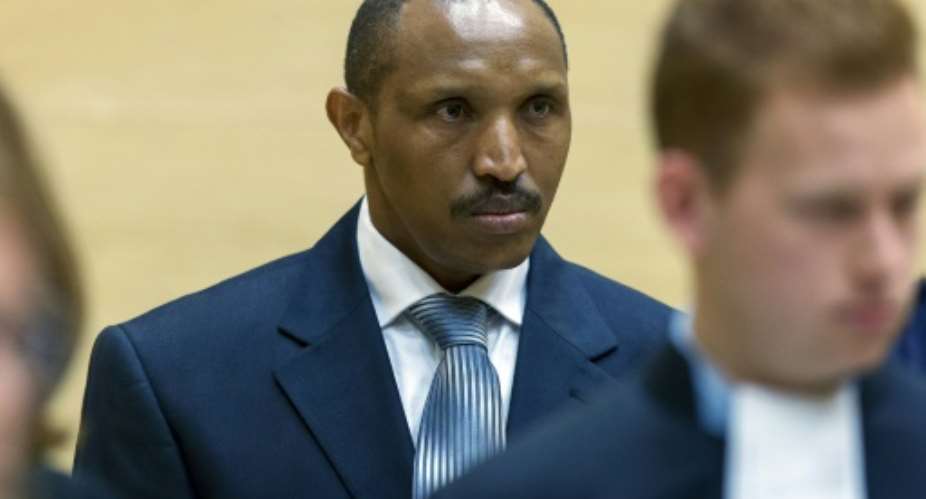The Hague (AFP) - Congolese warlord Bosco Ntaganda was Thursday to address his war crimes trial at the International Criminal Court, speaking publicly for the first time since surrendering to the US embassy in Kigali in 2013.
Ntaganda, also dubbed "The Terminator," faces 18 charges of war crimes and crimes against humanity before the Hague-based court, where his trial is entering a second day.
With the trial being broadcast on local radio stations in the Democratic Republic of the Congo, it will be the first time his alleged victims will hear the former rebel leader defend himself.
He has pleaded not guilty, but lawyers representing victims opened Thursday's hearing with harrowing details of horrific abuses allegedly unleashed by Ntaganda's rebel forces from 2002-2003.
Lawyer Dmytro Suprun told how one woman tried to crawl away from an attack.
"They (the soldiers) caught up with her and cut her and her baby to pieces" with machetes, he said.
- Grisly images -
On the first day of what is expected to be a lengthy and complex trial, prosecutors showed judges grisly images of bodies littering a banana plantation as they accused the former rebel leader of running a campaign of terror in the northeastern Ituri region.
Bodies were dumped in the fields after being indiscriminately slaughtered, allegedly by Ntaganda's rebel Union of Congolese Patriot (UPC) troops.
Ntaganda has been charged with ordering hundreds of deaths in savage ethnic attacks, as well as with the recruitment and rape of child soldiers within his own rebel army.
"Bosco Ntaganda was one of the highest commanders... he gave the orders to attack and kill," ICC chief prosecutor Fatou Bensouda told the three-judge bench.
Lawyer Stephane Bourgon however told the judges Ntaganda's defence will present a "completely different picture".
"If I listen to the prosecution... well.. he's really terrible, this Mr Ntaganda," Bourgon said.
"The reality of what happened in the field between 2002-03 is completely different," Bourgon said, adding many of the accusations against Ntaganda arose from legitimate military activities in the region.
"Mr Ntaganda is a professional soldier, he's not a politician and never has he been one," said Luc Boutin, who is assisting Bourgon in Ntaganda's defence.
- Voice to be heard -
Ntaganda will Thursday address the court, for the first time publicly speaking at length since he walked into the US embassy in Kigali out of the blue two years ago and turned himself in.
The motives behind his surrender remain unclear, but some experts have speculated that he feared for his life after a schism among the rebels.
Eastern DR Congo has been mired for two decades in ethnically-charged wars, as rebels battle for control of its rich mineral resources.
The unrest spiralled to encompass armies from at least six African nations, claiming an estimated three million lives in one of the world's most deadly recent conflicts.
Despite protesting his innocence, prosecutors say the feared rebel commander played a central role in the Ituri conflict which rights groups believe alone left some 60,000 dead since 1999.
Known for his pencil moustaches, cowboy hats and love of fine dining, Ntaganda faces 13 counts of war crimes and five of crimes against humanity.
The court had issued two arrest warrants against Ntaganda -- the first in 2006 and the second with additional charges in 2012 for crimes committed in Ituri.
His former FPLC commander Thomas Lubanga was sentenced to 14 years in jail in 2012 on charges of using child soldiers, one of only two convictions handed down by the court since it was set up 12 years ago.





 Western North been sidelined for far too long; address our needs before 2024 ele...
Western North been sidelined for far too long; address our needs before 2024 ele...
 Effutu: 'Stop eating at night and take care of your health' — Afenyo Markin advi...
Effutu: 'Stop eating at night and take care of your health' — Afenyo Markin advi...
 Akufo-Addo's desperate attempt to disrupt Yagbonwura's 1st year anniversary cele...
Akufo-Addo's desperate attempt to disrupt Yagbonwura's 1st year anniversary cele...
 Armed robbers attack, rob Sethi Brothers Ghana Limited in Tema
Armed robbers attack, rob Sethi Brothers Ghana Limited in Tema
 SML deal: We commend Manasseh for holding gov't to account, Akufo-Addo for not s...
SML deal: We commend Manasseh for holding gov't to account, Akufo-Addo for not s...
 Our recall invocation is in good faith to consider three key issues – Majority
Our recall invocation is in good faith to consider three key issues – Majority
 You’re inviting bad luck upon yourself if you use Indian hair — Spiritualist war...
You’re inviting bad luck upon yourself if you use Indian hair — Spiritualist war...
 Ejisu by-election: Police questions Kwadaso MP, two others over bribery allegati...
Ejisu by-election: Police questions Kwadaso MP, two others over bribery allegati...
 Nana Kwame Bediako is Nkrumah’s reincarnate; he’ll be president if he appoints N...
Nana Kwame Bediako is Nkrumah’s reincarnate; he’ll be president if he appoints N...
 Dumsor: Mahama gave us ‘dum, dum, dum’ but we are now in the era of ‘dum sie sie...
Dumsor: Mahama gave us ‘dum, dum, dum’ but we are now in the era of ‘dum sie sie...
